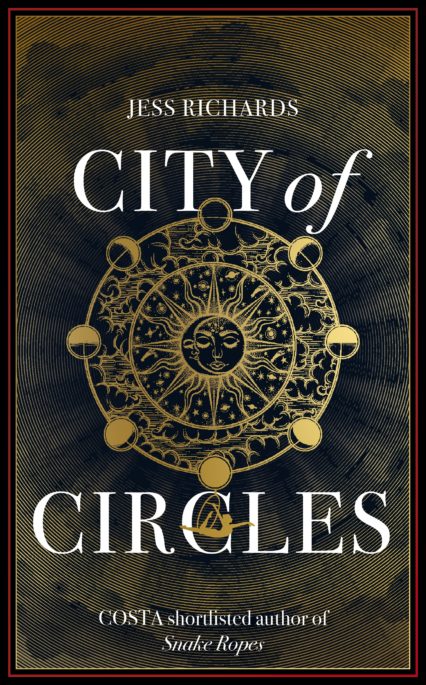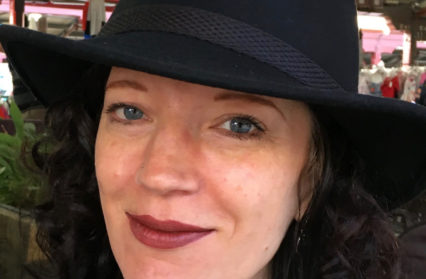When I started writing City of Circles, I was freezing. I was visiting family in Scotland, and it was winter. Each time the door opened, icy wind blew in. My parents had read to me in this house when I was a child. A story could always make me forget where I was. A fire flickered in the wood burner as I wrote about a warm climate. A mountain, with fire burning beneath it. A volcano. My hands warmed as I imagined this place.
 I used to play alone for hours as a child, when my three brothers were busy with their own things. I might have been telling myself stories, or imagining them. I once believed I was a statue, deaf to all sound because I had stone ears. Sometimes I’d be outside flying through the coldest wind and get tangled in the washing line as I landed. I often wanted to be blown back to Wales, where I was born, though we’d left when I was a baby so I couldn’t remember it. So often, we stop experiencing magical things when we become adults. The ‘real’ world teaches us to only dream when we’re asleep.
I used to play alone for hours as a child, when my three brothers were busy with their own things. I might have been telling myself stories, or imagining them. I once believed I was a statue, deaf to all sound because I had stone ears. Sometimes I’d be outside flying through the coldest wind and get tangled in the washing line as I landed. I often wanted to be blown back to Wales, where I was born, though we’d left when I was a baby so I couldn’t remember it. So often, we stop experiencing magical things when we become adults. The ‘real’ world teaches us to only dream when we’re asleep.
If we let ourselves, we can still use our imaginations to escape from the ‘real’ world. And within stories, the characters can take things from our ‘real’ world and reimagine them into the story.
City of Circles is about a circus girl called Danu. Her parents die when she is fifteen and as the circus keeps moving on, she grows up trying to make sense of her world without them. While I was on a literature retreat at Cove Park in Scotland, I wrote the story of the architect who designed the city of circles, which he called Matryoshka. After the city was built, and the last stone was laid,
“The architect looked to the horizon. As the celebrations began, he slipped away, seeking the next landscape which would spark his imagination. The architect left his initial drawing behind. It was so beautiful the inhabitants framed it in gold filigree and hung it in the main hall of the library.”
After writing several chapters of City of Circles, my time at Cove Park was over. As I left, my long-term relationship ended and I became voluntarily homeless. To spend time on my own and find space to write, I travelled around, living as cheaply as possible. I sought house-sitting opportunities wherever I could, and applied for other writing retreats. For nearly two years I felt unable to settle down anywhere. Through another cold winter, I looked after some holiday cottages at Kintyre for five months, and up on those hills there was a view of the grey Irish sea. It was tough at times. I wrote the anchoress’: “Fifteen words for Loneliness” and felt each and every one of them.
As I moved on, and on again, I sought out magic, strangeness and beauty everywhere I went. Because I looked for it, I found it. I gave this magic to Danu. She said: “The north is a strange landscape at times…” and extended on what my eyes saw, using her own imagination to list what she saw:
“The blackened ridge – coal cliffs loom over a basin of charcoal sand.
On a heath, red dogwood stems push through scorched heather.
The smoke village – each smallholding houses a burning brazier in its backyard.
A moor formed entirely of grey rock, black ice frozen in seams, eagles circling.
Deserted villages within a forest, webbed curtains, antique keys rusted into locks.”
Morrie, a charismatic hunchback, taught Danu to tightrope walk, and the pair developed a popular act which was based on one of Danu’s stories – about a moth and donkey who were tragically in love with each other. This story mirrored their own relationship, because Morrie wanted to marry Danu, but she was heartbroken and confused as she grieved her parents.
When the circus arrived in Danu’s birthplace, the magical city of Matryoshka, Danu fell in love with its spice mists and curiosities, and was fascinated by the strange and colourful people all around her. As I’d stayed in cities as well as in remote rural areas, many cities found their way into Matryoshka, which was divided into three circular districts. In the outer circle, the brightly coloured timber buildings were reminiscent of a merging of tall European houses and the colours of the tin rooftops in Wellington. The second circle was built from stone, and had areas which resembled parts of Glasgow, London and Chicago.
While Morrie was alone, he mirrored how I sometimes felt while travelling. It was easy to be silent in cities filled with strangers. And sometimes when I didn’t speak for a long time, it was hard to remember how to.
“In the larger towns, there’s laughter and fuss in the main streets, but Morrie never speaks a word.
Further along the road, he takes another detour and stops in a forest. For over a week he hears nothing but the sounds of leaves and the rare yowls of vixen.
When he leaves the forest, he helps a stooped farmer hoik a ewe out of a ditch it’s near on drowning in.
Morrie doesn’t speak a word to him either.
The farmer thanks him… He says, ‘Must be a hard life you’re living, being a mute.’
It’s deceitful not to correct the farmer’s mistake, but Morrie needs to be silent and stare at other horizons for a time.”
When Danu opened her dead mother’s locket, she found the name of a woman who lived behind a locked silver gate in the mysterious Inner Circle of Matryoshka. The heart (and pinnacle) of the city was hidden in mists and fogs. When I first wrote about the Inner Circle, I’d just spent some time with a friend in Cumbria. His house was so high that it was like being in the sky, looking down into clouds.
The journey I was on while writing City of Circles reminded me to keep looking for magic, no matter how difficult or troublesome the ‘real’ world might appear. And in doing so, I found magic everywhere. I remembered how to think like a child. How to dream, while awake.
As Morrie and the circus left Matryoshka, Danu stayed behind alone. She needed to find out what the missing part of her own story was. While writing this novel, I was searching for something as well. When I found it – a new love – and a new home, I could finish Danu’s story. I completed the first draft in New Zealand, during a long and windy summer.
I was finally warm.












